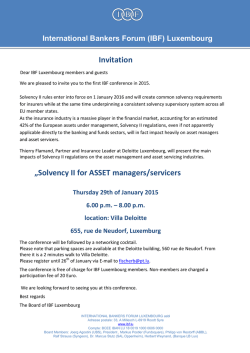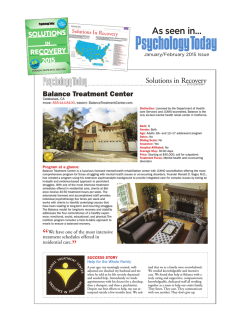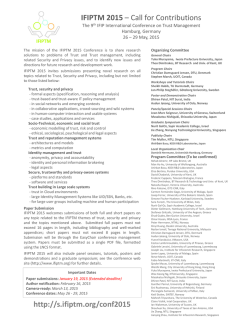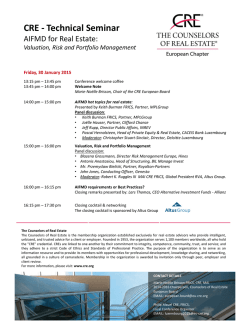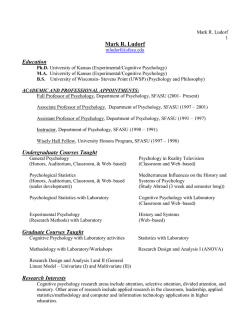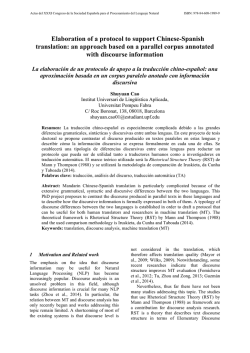
HERA Joint Research Programme
HERA Joint Research Programme Application Template for a Project Idea to attend the Matchmaking Event on 29th January 2015 in Tallinn, Estonia Name and Organisation of the Applicant: Dr. Elke Murdock, Research Unit INSIDE, Université du Luxembourg Title of the Project Idea: “Living the past” - Nationality construals and the attitude towards plurally composed societies: A comparative study across smaller/ Northern European countries The Project Idea should include the following elements: 1.a Part 1: Project Idea description, structured as outlined below and not exceeding a maximum of 800 words in total. Part 2: a one-page CV of the proposer with up to 5 main publications and major project experience. A short description of your Project Idea and its objectives The Russian-born, American developmental psychologist U. Bronfenbrenner was one of the first social scientist to recognize that interpersonal relationships do not exist in a social vacuum, but are embedded in larger societal structures, which are in turn outcome of the socio-historical context. Taking this interplay between past and present explicitly into consideration, a recent research project was carried out within the Luxembourg context. Luxembourg, within its current borders, is a fairly young state with the highest immigration rate per capita in Europe. The study employed a multi-method, multi-disciplinary approach combining a socio-historic analysis of national identity construal with an empirical study into the current attitude towards the plurally composed society of Luxembourg today. Key findings include a recurring theme of size and language (trilingualism and Lëtzebuergisch) in the national identity discourse, a persistence of primordial understanding of nationality (i.e. passed on through lineage rather than socially constructed) within parts of the population, resulting in reluctance towards accepting inclusive national identities. The key idea is to replicate this research approach, comparing other small countries, analyze their path to sovereignty and pathways which have led to the demographic composition of today. The aim is to identify similarities and differences in the current discourse on national identity. Does size matter? Are there common discourses in terms of vulnerabilities, but also in terms of pride in the achievements of a small country? What are the differences between countries and how do they manifest themselves? What is the attitude towards a more plural composition of society and which factors influence this attitude? The linguistic landscape as well as the demographic make-up of the foreign population (i.e. cultural distance and integration, diversity and dominant group) within each participating country have to be taken into consideration. Specifically, the suggested focus is on smaller (in terms of population) Northern European countries (i.e. Iceland, Finland, Norway and Denmark) which have more recently become target countries for immigration. The project will include Estonia and Latvia as more recent entrants to the European Union. Within those states, the empirical part would focus less on inward migration, but more on the existing demographic composition. 1.b Describe how the Project Idea: Fits with the HERA Joint Research Programme theme “Uses of the Past” Is novel and original Has European added-value for trans-national collaboration: describe why it is essential to carry out the proposed research as a European collaboration Starting point for the project idea is the analysis of the socio-historical context in smaller European countries with the aim of identifying themes within the current discourse on nationality construals. Using the recent study as a template, discourse by different stakeholders – i.e. Government, Academia, local interest groups and the media can be analysed for recurring themes. The analysis of the past is then combined with an empirical study exploring the attitude towards increasingly diverse demographic compositions of societies. Analysing the past, or rather the construal processes or interpretations of the past, is a core element of understanding how the current discourse on national identity has been shaped. On the one hand, there is ever greater connectedness (globalization), but also a tendency for ethnic protectionism. Against this background it is important to understand present attitudes towards multiculturalism and the factors contributing to openness towards a plural society at individual level – the focus of the empirical part of the proposed project. Novelty and Originality The study aims to combine an analysis of the socio-historic context, based on literature review and content/ discourse analysis with an empirical study on current attitudes towards multiculturalism. The study is also multidisciplinary, with the former part involving historians, political scientists, sociologists, and possibly other social scientists whereas the latter is in the psychological domain. The findings of the socio-historical context research and the results of the empirical work can then be combined to provide a holistic overview over the understanding of nationality construal including the attitude towards demographically increasingly diverse societies. For each participating country, an in-depth within-country analysis can be carried out, followed by a comparison across countries. European added value for transnational collaboration The project is conceptualized as a comparative study and within this focusing on smaller Northern European and Baltic countries. This approach allows the identification of withingroup similarities as well as differences regarding the construals of the past and current attitudes towards multiculturalism. Given on the one hand growing interdependence of countries within Europe and rising migration levels, populist right-wing rhetoric, often expressed in the form of anti-immigration rhetoric is also observed in many European countries. Against this background, it is important to gain a better understanding of the dynamics of attitudes towards pluralism. The proposed study aims to focus on smaller and new countries within the European Union. Depending on the outcome, if similarities dominate, smaller countries can combine speaking as one voice and big player in European discussion. If differences dominate, differential treatment / policies need to be designed. In either case the study would make a contribution to improving the understanding of diversity within the unity of Europe by using the past histories of all countries involved. 2. A one-page CV of the proposer including up to 5 main publications and major project experience Curriculum Vitae Dr. Elke Murdock (Dipl.–Psych.) [email protected] Current position Since 10/2014 Postdoctoral Member of Scientific Staff, Integrative Research Unit: Social and Individual Development (INSIDE), Institute for Research on Generations and Family (Director: Prof. Dr. Dieter Ferring), Project IRMA (Intergenerational Relations in the Light of Migration and Ageing; PI: Dr. Isabelle Albert). 09/2014 Graduation to Docteur de l’Université de Luxembourg en Psychologie. Thesis Topic: Multiculturalism within the Luxembourg Context. A study of individual difference variables influencing attitudes towards the plural composition of society. Grade: excellent. Supervisor: Prof. D. Ferring. External Reviewers: Prof. J. Valsiner (Aalborg Universitet, DK, Clark University, USA), Prof. (emeritus ) M. Barrett ( University of Surrey, UK), Prof. A. Hu (ECCS, University of Luxembourg). 10/2010-09/2014 Doctoral Researcher ( funded by the Luxembourg National Research Fund ) – Research Unit INSIDE Work Experience 06/2004–03/2007 Investor Communications. Schroders Asset Management, Luxembourg. 11/1990–02/2002 Strategic Development/ International Division, Scottish Equitable/ AEGON, Edinburgh, Scotland, UK. Academic Training 1992-1994 M.B.A. Heriot-Watt University, Edinburgh, Scotland, UK. Thesis Topic: The Perception of the Deutsche Bundesbank from an Anglo-German Perspective. 1984-1990 Diploma in Psychology, Saarland University, Germany. Thesis Topic: Kulturelle Identität – Eine Konzeptanalyse im interdisziplinären Raum (Cultural Identity – an interdisciplinary concept analysis). 1989 Erasmus Exchange Programme, University of Aberdeen, Scotland, UK. 1987-1988 M.Sc. in Psychology, Western Washington University, USA. Thesis Topic: An analysis of the cross-cultural content of introductory psychology textbooks. 1986-1987 B.A. in Psychology, Western Washington University, USA. Fulbright Scholarship. Publications Murdock, E., Hirt, F., & Ferring, D. (2014). Salience of nationality in students’ spontaneous self-concept: A comparative study of a nationally homogeneous and a heterogeneous school context. Journal of Research in International Education, 13(2), 119–134, doi: 10.1177/1475240914539797 Murdock, E., & Ferring, D. (2014). On being bicultural in multicultural society. Newsletter (May, 2014) of the European Association for Research on Adolescence (EARA). Murdock, E. (2012). National Identity: Integrity and Diversity in Contemporary Europe. The Construal of National Identities within the Luxembourg Context, Ethnicity, 2(7), 70–85. Lonner, W. J., & Murdock, E. (2012). Introductory Psychology Texts and the Inclusion of Culture. Online Readings in Psychology and Culture, Unit 11. http://scholarworks.gvsu.edu/orpc/vol11/iss1/1 Lonner, W.J., Smith, P.B., van de Vijver, F. J. R., & Murdock, E. (2010).Entering Our Fifth Decade: An Analysis of the Influence of the Journal of Cross-Cultural Psychology During Its First Forty Years of Publication, Journal of Cross-Cultural Psychology, 41 (3), 301-317. Save this file in PDF format and upload it as part of your application to participate in the HERA JRP Uses of the Past Match Making Event.
© Copyright 2026
